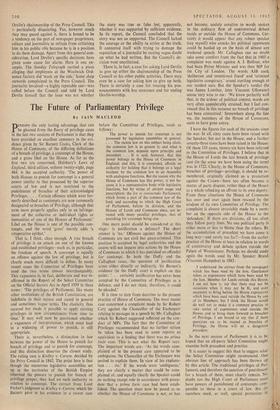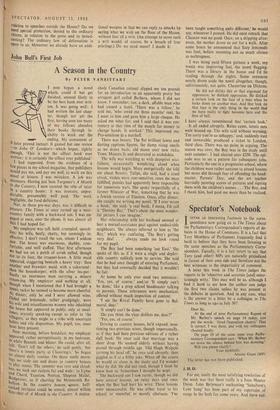The Future of Parliamentary Privilege
By LAIN MACLEOD
PERHAPS the only lasting advantage that can be gleaned from the flurry of privilege cases in the last two sessions of Parliament is that they
have provided an excellent summary in the evi- dence given by Sir Barnett Cocks, Clerk of the House of Commons, of the differing definitions of a breach of privilege, a contempt of the House, and a gross libel on the House. As far as the
first two are concerned, Halsbury's Laws of England, third edition, volume twenty-eight, page 464, is the accepted authority. The power of both Houses to punish for contempt is a general power similar to that possessed by the superior courts of law and is not restricted to the punishment of breaches of their acknowledged Privileges. . . . Certain offences which were for- merly described as contempts are now commonly designated as breaches of Privilege, although that term more properly applies only to an infringe- ment of the collective or individual rights or immunities of one of the Houses of Parliament.' Libel on the House is one of the possible con- tempts, and the word 'gross' merely adds 'a vituperative epithet.'
That is, I think, clear enough. A true breach of privilege is an attack on one of the known and established privileges—such as, in particular, the freedom of speech. A contempt is equally an offence against the law of privilege, but is clearly much more difficult to define. In many recent cases the Committee of Privileges have used the two terms almost interchangeably. This vagueness is, in fact, deliberate and was re- affirmed in the Report of the Select Committee on the Official Secrets Act in April 1939 in these terms: 'The privileges of Parliament, like many other institutions of the British Constitution, are indefinite in their nature and stated in general and sometimes vague terms. The elasticity thus secured has made it possible to apply existing privileges in new circumstances from time to time.' It may well now be questioned whether a vagueness of interpretation, which must lead to a widening of power to punish, is still appropriate.
There is, nevertheless, a distinction in law between the power of the House to punish for breach of privilege and to punish for contempt, and this distinction deserves the closest study. The ruling case is Kielley v. Carson, decided by the Privy Council in 1842. The point here is that though the numerous legislative assemblies set up in the territories of the British Empire inherited the powers to punish for breach of privilege proper, they had no such authority in relation to contempt. The extract from Lord Parker's judgment in Kielley v. Carson, which Sir Barnett gave in his evidence in a recent case before the Committee of Privileges, reads as follows:
The power to punish for contempt is not possessed by legislative assemblies in general.
. . . The statute law on this subject being silent,
the common law is to govern it; and what is the common law, depends upon principle and precedent. It is said, however, that this
power belongs to the House of Commons in England; and this, it is contended, affords an authority for holding that it belongs as a legal incident, by the common law to an Assembly with analogous functions. But the reason why the House of Commons has this power, is not be- cause it is a representative body with legislative functions, but by virtue of ancient usage and prescription; the lex et consuetudo Parliamenti, which forms a part of the common law of the land, and according to which the High Court of Parliament, before its division, and the Houses of Lords and Commons since, are in- vested with many peculiar privileges, that of punishing for contempt being one.
One more point should be considered at this stage: is justification a defence? The short answer is `no.' Offences against the House of Commons are not civil but quasi-criminal. This position is accepted by legal authorities and the Courts will not inquire into actions by the House of Commons in which it has punished an offender for contempt. In both the Duffy and the Callaghan cases, the question of justification arose either directly or indirectly. Sir Barnett's evidence (in the Duffy case) is explicit on this point: . . certainly justification has never been accepted by the Committee of Privileges as a defence, and I do not think, therefore, it could be pleaded.'
It is time to turn from doctrine to the present practice of House of Commons. The most recent case concerned a complaint made by Sir Robert Cary against the Chancellor of the Exchequer relating to passages in a speech by Mr. Callaghan which Sir Robert suggested reflected on the con- duct of MPs. The fact that the Committee of Privileges recommended that no further action be taken has been read in some reports as equivalent to a finding that there was no prima facie case. This is not what the Report says. The important words are: 'As the words com- plained of in the present case appeared to be ambiguous, the Chancellor of the Exchequer was invited to explain them. In view of his explana- tion . . . etc.' If the words were 'ambiguous,' they are clearly a matter that could be com- plained of, and equally clearly the Speaker could do nothing except rule in accordance with prece- dent that a prima facie case had been estab- lished. The question must now be posed as to whether the House of Commons is not, or has• not become, unduly sensitive to words spoken in the ordinary flow of controversial debate inside or outside the House of Commons. Cer- tainly it would appear that any robust speaker (say myself) who attacks his political opponents could be hauled up on the basis of almost any weekend speech. Mr. Callaghan can no doubt take some comfort from the fact that in 1907 a complaint was made against A. J. Balfour, who had been Prime Minister and was then MP for the City of London. The words AJB used, 'deliberate and intentional fraud' and 'criminal legislative conspiracy.' sound startling enough tb our modest ears. But the Speaker's verdict (he was. James Lowther, later Viscount Ullswater) seems very wise to me: 'We know perfectly well that, in the ardour of political contest, words are very often considerably strained; but I feel con- vinced that in this instance no breach of privilege has been committed.' Somewhere along the line we, the members of the House. of Commons, seem to have gone astray.
I have the figures for each of the sessions since the war. In all, sixty cases have been raised with the Speaker, but not in the House, and a further seventy-three cases have been raised in the House. Of these 133 cases, twenty-six have been referred to the Committee of Privileges. I believe that in the House of Lords the last breach of privilege case (in the sense we have been using the term) was in 1722. Clearly, in the House of Commons, breaches of privilege—privilege, it should be re- membered, originally claimed as a protection against the Crown—have too often become a matter of party dispute, rather than of the House as a whole rebuking an affront to its own dignity. From these situations the House of Commons has over and over again been rescued by the wisdom of its own Committee of Privilege. The complaint is almost invariably made by a mem- ber on the opposite side of the House to the 'defendant.' If there are divisions, all too often they follow party lines. No one political party is either more or less to blame than the others. By the accumulation of precedent we have conic a long way—and surely too far?—from the earlier practice of the House at least in relation to words of controversy and debate spoken outside the Palace of Westminster. Perhaps we should study again the words used by Mr. Speaker Brand (Viscount Hampden) in 1883:
I understand the extract from the newspaper which has been read by the hon. Gentleman refers to expressions which have been used by the hon. Member for Leeds outside this House. I am not here to say that there may not be occasions when it may not be fit, and even necessary to bring before the House expressions which have been used outside the House by one of its Members; but I think the House would do well not to make it a common practice to take notice of expressions used outside the House, and to bring them forward as breaches of Privilege. I am bound to say that if these questions are to be treated as breaches of Privilege, the House will set a dangerous precedent.
In the next session of Parliament it is to be hoped that an all-party Select Committee might examine both precedent and practice.
It is easier to suggest this than to suggest what the Select Committee might recommend. One obvious line of approach has been thrown up by this article. The traditional privileges of Par- liament, and therefore the sanction of punishment for a breach of them, must clearly remain. No doubt too the High Court of Parliament must have powers of punishment of contempts com- parable to those in a court of law. But do members need, as well, special protection
relation to speeches outside the House? Do we need special protection, denied to the ordinary citizen, in relation to the press and to broad- casting? The ordinary law of defamation is Open to us. Moreover we already have an addi- tional weapon in that we can reply to attacks by saying what we wish on the floor of the House, without fear of a writ. (An attempt to serve such a writ would, of course, be a breach of true privilege.) Do we need more? I doubt it.































 Previous page
Previous page